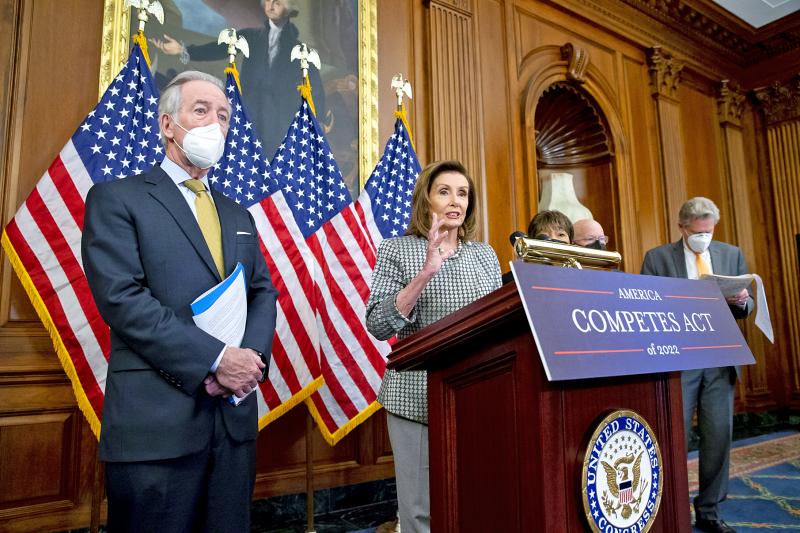The US House of Representatives on Friday narrowly passed a multibillion-dollar bill aimed at increasing US competitiveness with China and boosting domestic semiconductor manufacturing, despite Republican opposition.
The Democratic-majority House backed the “America COMPETES Act of 2022” by 222 to 210, almost entirely along party lines.
One Republican joined Democrats in voting for the measure, and one Democrat voted against.

Photo: EPA-EFE
The vote took place hours after the opening ceremony for the Beijing Winter Olympics, amid criticism in the US Congress of the International Olympic Committee for awarding the Games to China.
Human rights groups have long criticized China’s rights record, allegations China denies.
The bill’s passage by the House set up negotiations with the US Senate on a compromise version of the legislation, which must pass both chambers before it can be sent to the White House for US President Joe Biden to sign.

Photo: Lu Yi-hsuan, Tapei Times
The talks could take weeks or months, although Biden urged quick action in a statement praising what he called “vital” legislation.
“Every day we delay we fall farther behind, and that increases our domestic national security risk,” US Secretary of Commerce Gina Raimondo told a news conference.
The House bill authorizes almost US$300 billion for research and development, including US$52 billion to subsidize semiconductor manufacturing and research into the key components. It also earmarks US$45 billion over six years to ease supply chain problems that have exacerbated shortages.
It includes changes to US trade rules intended to offset China’s market distorting trade practices, including by strengthening antidumping rules.
The bill would authorize US$8 billion in US contributions to the Green Climate Fund, established by the Paris Agreement to combat climate change and help developing countries cope.
House Speaker Nancy Pelosi told reporters before the vote that she intended to begin negotiations with the Senate quickly.
“It is about making America ... self-sufficient when it comes to the supply chain, so that we’re not depending on other countries,” she said.
Raimondo said companies had told the White House that without the chips funding, they would build new plants outside the US.
The Semiconductor Industry Association praised the bill.
Arizona Technology Council president Steve Zylstra said the bill was “profoundly important” to the state’s ambitions of becoming the center of excellence for semiconductors in the US, after Intel Corp and Taiwan Semiconductor Manufacturing Co (台積電) have announced plans to build new plants there.
House Republicans complained that Democrats did not include them in drafting the legislation.
They harshly criticized the climate provisions, saying that they could be used to help Beijing, and accused Democrats of using the China measure to advance parts of Biden’s economic agenda that could not pass the Senate.
House Democrats said Republicans had refused to engage with them while they wrote the legislation.
The bill includes all or part of more than 60 smaller measures that Republicans had cosponsored, they added.
The Senate passed its own bill — the “US Innovation and Competition Act” — by 68 to 32 in June last year. Eighteen Republicans joined every Senate Democrat in voting “yes.”
That legislation includes US$52 billion to increase domestic semiconductor production, and authorizes US$190 billion for US technology and research to compete with China.
The House bill also includes some pro-Taiwan provisions previously initiated by lawmakers.
These include the draft “Taiwan Fellowship Act,” “Taiwan Diplomatic Review Act,” “Taiwan Peace and Stability Act” and “Taiwan International Solidarity Act,” as well as the Taiwan Allies International Protection and Enhancement Initiative (TAIPEI) Act.
The Taiwan Diplomatic Review Act asks the US secretary of state to negotiate a name change for the Taipei Economic and Cultural Representative Office in the US, Taiwan’s de facto embassy in Washington.
In Taipei, the Ministry of Foreign Affairs thanked the US Congress for its continuous efforts to deepen Taiwan-US relations through legislation and other actions that demonstrate strong support for Taiwan.
The ministry said it would monitor the follow-up review of the House bill and maintain close contact with friends in Congress to deepen the close partnership between the two countries.
Democratic Progressive Party (DPP) spokeswoman Hsieh Pei-fen (謝佩芬) said in a news release that the DPP appreciates the House’s cross-party support for Taiwan and looks forward to the continued deepening of bilateral relations with the US.
Hsieh said that many breakthroughs in Taiwan-US relations in the past few years have depended on congressional support, for which the DPP is deeply grateful.
Additional reporting by CNA

US President Donald Trump yesterday announced sweeping "reciprocal tariffs" on US trading partners, including a 32 percent tax on goods from Taiwan that is set to take effect on Wednesday. At a Rose Garden event, Trump declared a 10 percent baseline tax on imports from all countries, with the White House saying it would take effect on Saturday. Countries with larger trade surpluses with the US would face higher duties beginning on Wednesday, including Taiwan (32 percent), China (34 percent), Japan (24 percent), South Korea (25 percent), Vietnam (46 percent) and Thailand (36 percent). Canada and Mexico, the two largest US trading

AIR SUPPORT: The Ministry of National Defense thanked the US for the delivery, adding that it was an indicator of the White House’s commitment to the Taiwan Relations Act Deputy Minister of National Defense Po Horng-huei (柏鴻輝) and Representative to the US Alexander Yui on Friday attended a delivery ceremony for the first of Taiwan’s long-awaited 66 F-16C/D Block 70 jets at a Lockheed Martin Corp factory in Greenville, South Carolina. “We are so proud to be the global home of the F-16 and to support Taiwan’s air defense capabilities,” US Representative William Timmons wrote on X, alongside a photograph of Taiwanese and US officials at the event. The F-16C/D Block 70 jets Taiwan ordered have the same capabilities as aircraft that had been upgraded to F-16Vs. The batch of Lockheed Martin

GRIDLOCK: The National Fire Agency’s Special Search and Rescue team is on standby to travel to the countries to help out with the rescue effort A powerful earthquake rocked Myanmar and neighboring Thailand yesterday, killing at least three people in Bangkok and burying dozens when a high-rise building under construction collapsed. Footage shared on social media from Myanmar’s second-largest city showed widespread destruction, raising fears that many were trapped under the rubble or killed. The magnitude 7.7 earthquake, with an epicenter near Mandalay in Myanmar, struck at midday and was followed by a strong magnitude 6.4 aftershock. The extent of death, injury and destruction — especially in Myanmar, which is embroiled in a civil war and where information is tightly controlled at the best of times —

China's military today said it began joint army, navy and rocket force exercises around Taiwan to "serve as a stern warning and powerful deterrent against Taiwanese independence," calling President William Lai (賴清德) a "parasite." The exercises come after Lai called Beijing a "foreign hostile force" last month. More than 10 Chinese military ships approached close to Taiwan's 24 nautical mile (44.4km) contiguous zone this morning and Taiwan sent its own warships to respond, two senior Taiwanese officials said. Taiwan has not yet detected any live fire by the Chinese military so far, one of the officials said. The drills took place after US Secretary